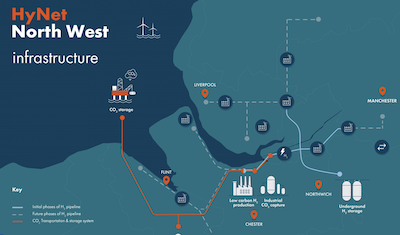The UK government has pledged to invest up to £22 billion in two carbon capture sites in the industrial heartlands of the North West and North East of England.
The government said the plan — for the Hynet development in the North West and North Wales, and the East Coast Cluster in Teesside and the Humber — will directly create 4,000 jobs and support 50,000 jobs in the long-term while powering up the rest of the country.
“Today’s announcement confirms up to £21.7 billion of funding available, over 25 years, to make the UK an early leader in two growing global sectors, CCUS and hydrogen, to be allocated between these two clusters,” said the government.
“The UK’s commitment was first made in 2009, and the confirmation of funding today represents a major success story for British industry.
“In the week in which Britain became the first industrialised nation to end its 150-year usage of coal to produce power, the nation now begins a new era of clean energy technology.
“The UK has enough capacity to store 200 years’ worth of emissions – making CCUS a revolutionary method in tackling the climate crisis and helping industry to decarbonise.”

The government said CCUS technology removes CO2 emissions before it reaches the atmosphere and stores it safely beneath the seabed – using tried and tested technology that has been deployed across the globe for over 20 years.
It said the new carbon capture and CCUS enabled hydrogen projects will help remove over 8.5 million tonnes of carbon emissions each year – the equivalent of taking around 4 million cars off the road.
Prime Minister Keir Starmer, Chancellor Rachel Reeves and Energy Secretary Ed Miliband visited the North West to confirm the funding for the two sites in Teesside and Merseyside, which are expected to bring in £8 billion of private investment into these communities.
Starmer said: “We’re reigniting our industrial heartlands by investing in the industry of the future.
“For the past 14 years, business has been second-guessing a dysfunctional government – which has set us back and caused an economic slump.
“Today’s announcement will give industry the certainty it needs – committing to 25 years of funding in this groundbreaking technology – to help deliver jobs, kickstart growth, and repair this country once and for all.”
Miliband said: “On Monday, 150 years of coal in this country came to an end. Today, a new era begins.
“By securing this funding, we pave the way for securing the clean energy revolution that will rebuild Britain’s industrial heartlands.
“I was proud to kickstart the industry in 2009, and I am even prouder today to turn it into reality. This funding is a testament to the power of an active government working in partnership with businesses to deliver good jobs for our communities.”
Reeves said: “This game-changing technology will bring 4,000 good jobs and billions of private investment into communities across Merseyside and Teesside, igniting growth in these industrial heartlands and powering up the rest of the country.
“Working in partnership with business is at the heart of our plan to deliver strong growth and investment, so we can rebuild Britain and make everyone better off.”
The government added: “The carbon capture, usage and storage industry is expected to support 50,000 good, skilled jobs as the sector matures in the 2030s, helping to support the oil and gas sector’s transition away from high emission fossil fuels by using the transferable expertise of their workforce.
“This supports the UK’s mission for growth, while putting the country at the cutting edge for developing the skills of the future.
“An up and running carbon capture industry is expected to add around £5 billion per year to the UK economy by 2050 and the backing of these 2 sites sends a clear signal to investors that the UK is open for business.
“As part of the partnership with GB Energy and The Crown Estate, the progress on Track-1 comes as The Crown Estate awarded an Agreement for Lease to Eni to repurpose existing infrastructure to transport and store CO2, reducing cost and environmental impact.”
Louise Kingham, SVP Europe and head of country, UK for bp, said: “This announcement represents another step forward for the Northern Endurance Partnership and East Coast Cluster.
“Major projects like these have the potential to help stimulate economic growth – supporting thousands of jobs, helping UK companies prosper through the vast supply chains involved and creating the infrastructure to help major industrial companies with their decarbonisation plans.
“Collaboration is key in helping to progress and deliver the energy transition in the UK, and we look forward to continuing to work alongside the government and our partners to move these innovative projects forward.”
Alex Grant, SVP and head of country, UK for Equinor, said: “We welcome this major milestone in progressing these 2 key projects and applaud the hard work and collaboration that has led us here.
“Equinor has been an energy partner with the UK for over 45 years and today’s announcement is a step for both Equinor and the UK to progress our energy partnership further.
“This will help decarbonise the country’s industrial heartlands and achieve its net zero ambitions whilst providing jobs and value creation.
“The UK will continue to be a key market for Equinor, building on our history of significant energy provision along its East Coast, which is transitioning from traditional oil and gas demand to renewables and low carbon options like CCS and hydrogen.”
Eni CEO Claudio Descalzi said: “Today’s news is an important step towards the creation of a new business chain linked to the energy transition.
“HyNet will become one of the first low-carbon clusters in the world and the project will decarbonise one of the key energy-intensive industrial districts as well as unlock significant economic growth in this region of the UK.
“This commitment is clear evidence of how governments and industry can work together to implement pragmatic and effective industrial policies, in order to accelerate decarbonisation. On our side, it reaffirms Eni’s role as a key partner with the UK in enabling its journey towards Net Zero.”
